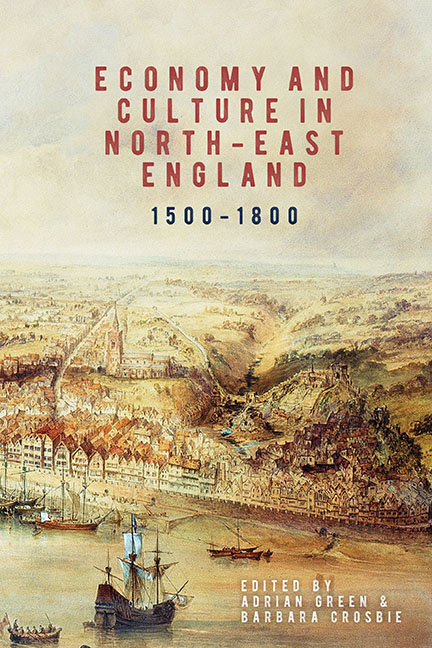Book contents
- Frontmatter
- Contents
- List of Maps, Figures and Tables
- Preface
- Contributors
- Foreword
- List of Abbreviations
- Map
- Introduction: ‘Beyond Coal and Class’: Economy and Culture in North-East England, 1500–1800
- 1 Church Leaseholders on Durham Cathedral's Estate, 1540–1640: The Rise of a Rural Elite?
- 2 Durham Ox: Commercial Agriculture in North-East England, 1600–1800
- 3 Fluctuating Fortunes: The Bowes Family and Lead Mining Concessions, 1550–1720
- 4 Material Matters: Improving Berwick-upon-Tweed's Urban Environment, 1551–1603
- 5 Work before Play: The Occupational Structure of Newcastle upon Tyne, 1600–1710
- 6 Maintaining Moral Integrity: The Cultural and Economic Relationships of Quakers in North-East England, 1653–1700
- 7 Shipping on the Tyne: The Growth and Diversification of Seaborne Trade in the Eighteenth Century
- 8 From Carboniferous Capitalism to Complementary Commerce: Coastal and Overland Trade between North-East England and Scotland, 1580–1750
- 9 Provincial Purveyors of Culture: The Print Trade in Eighteenth- Century Newcastle upon Tyne
- 10 Parish, River, Region and Nation: Networks of Power in Eighteenth-Century Wearside
- Bibliography
- Index
- Volumes Already Published
6 - Maintaining Moral Integrity: The Cultural and Economic Relationships of Quakers in North-East England, 1653–1700
Published online by Cambridge University Press: 13 July 2019
- Frontmatter
- Contents
- List of Maps, Figures and Tables
- Preface
- Contributors
- Foreword
- List of Abbreviations
- Map
- Introduction: ‘Beyond Coal and Class’: Economy and Culture in North-East England, 1500–1800
- 1 Church Leaseholders on Durham Cathedral's Estate, 1540–1640: The Rise of a Rural Elite?
- 2 Durham Ox: Commercial Agriculture in North-East England, 1600–1800
- 3 Fluctuating Fortunes: The Bowes Family and Lead Mining Concessions, 1550–1720
- 4 Material Matters: Improving Berwick-upon-Tweed's Urban Environment, 1551–1603
- 5 Work before Play: The Occupational Structure of Newcastle upon Tyne, 1600–1710
- 6 Maintaining Moral Integrity: The Cultural and Economic Relationships of Quakers in North-East England, 1653–1700
- 7 Shipping on the Tyne: The Growth and Diversification of Seaborne Trade in the Eighteenth Century
- 8 From Carboniferous Capitalism to Complementary Commerce: Coastal and Overland Trade between North-East England and Scotland, 1580–1750
- 9 Provincial Purveyors of Culture: The Print Trade in Eighteenth- Century Newcastle upon Tyne
- 10 Parish, River, Region and Nation: Networks of Power in Eighteenth-Century Wearside
- Bibliography
- Index
- Volumes Already Published
Summary
The establishment of Quakerism in north-east England
The economic implication of early industrialisation has at times overshadowed the individual social and cultural experiences of those living in north-east England. From the late sixteenth century onwards new social hierarchies were formed as money was earned in the coal industry, salt and glass manufacturing, mercantile trade and ship building at Newcastle upon Tyne, North Shields, South Shields and Sunderland. Placed within these economic activities were individuals defining themselves not only by their affiliations with business and industry but also through their cultural associations. Beginning in 1653, Quakers, later known as the Society of Friends, began a concerted ministering campaign in County Durham and Newcastle. As the Quaker movement evolved to form a structured and disciplined religious organisation, members within the North-east's meetings re-evaluated their economic activities to fit the moral code of the Society. The introduction of a meeting system, which consisted of local monthly and quarterly meetings, and a yearly meeting of Quakers in London, provided a local, regional and national platform to address issues among members. Meetings instructed their religious followers on how to live an orderly life and disciplined those who strayed from the Quaker principles. In north-east England the registers for the monthly meetings record the dynamic relationship between individual rank and file members and the authoritative nature of the meeting system. In particular, the minutes for Newcastle upon Tyne reveal the precarious relationship between the Society's moral beliefs, their enforcement of discipline and individual members’ participation in the economic growth of north-east England.
The Quaker movement in the 1650s is frequently defined by adherents’ use of public disorderliness. Their interpretation of an inner and direct communication with God – the Inner Light – was regarded as blasphemous by contemporary opponents. Quakers insisted on plain dress and socially levelling linguistic styles, and their ministerial efforts were often expressed through the interruption of church services and preaching in busy market places and large open spaces. There was no trained Quaker ministry, since the very notion of an exclusive clergy conflicted with the Quaker denouncement of purposefully educated ministers in the Church of England.
- Type
- Chapter
- Information
- Economy and Culture in North-East England, 1500–1800 , pp. 136 - 155Publisher: Boydell & BrewerPrint publication year: 2018



